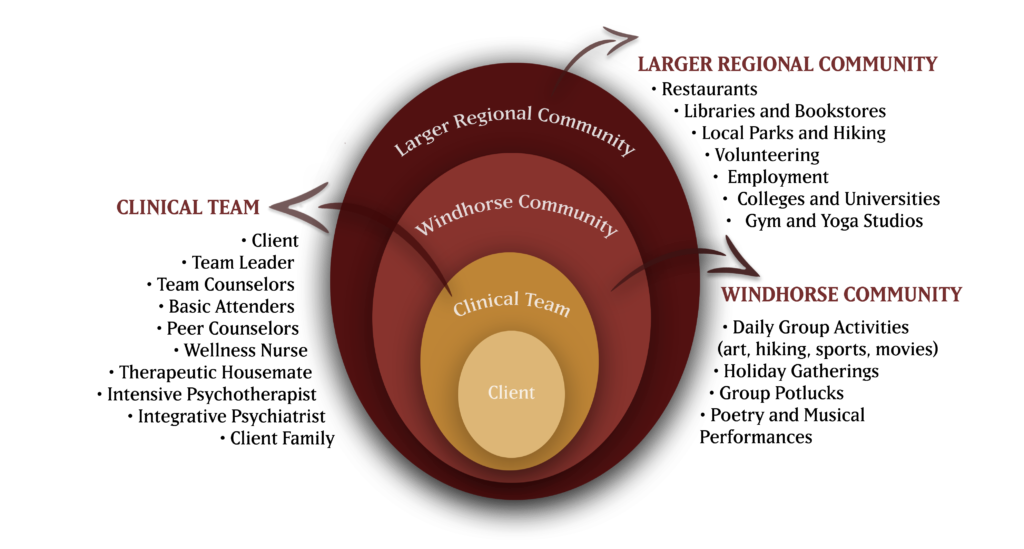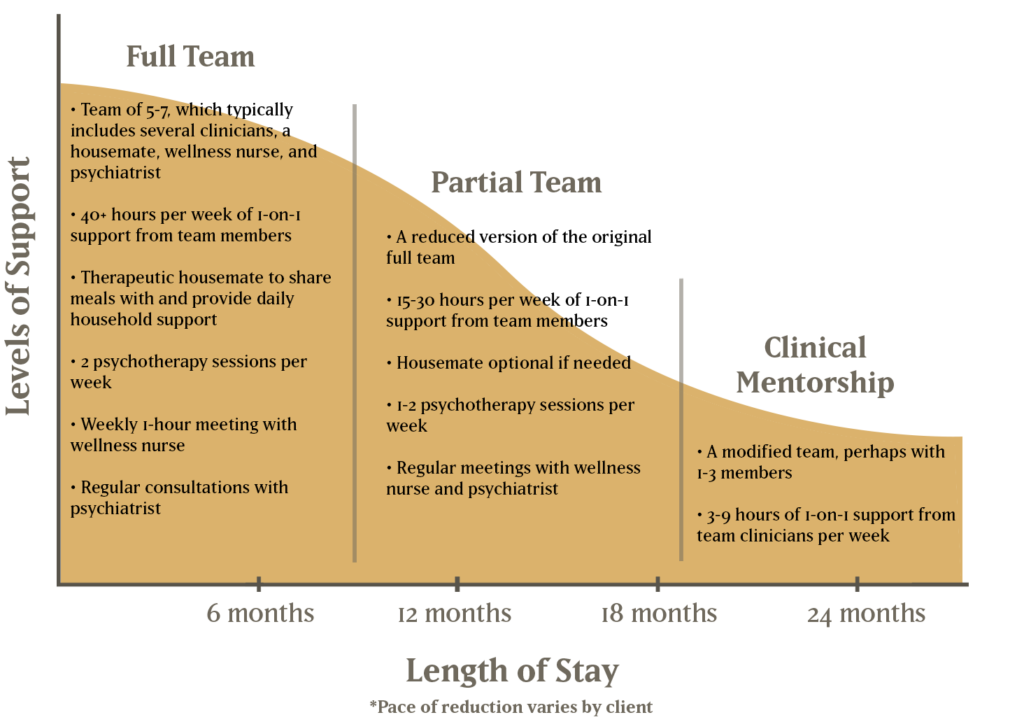
What we can do for others is create a positive environment in which they can discover their own wisdom . . . We can provide support for others to find their path, and once they have found it, help them to walk along that path, never giving up on them or their inherent potential to awaken to a genuine and lasting happiness.
—Dzogchen Ponlop (Brillant Sanity, p. xvii)
Team Process with One-on-One Support
Windhorse’s team-based model offers mindfulness-informed, relationally-oriented support to people recovering from psychiatric distress as they live in community. As opposed to a hospital or residential setting, our support and structure comes not from a building or facility, but from a dynamic, integrated team. At the fullest level of care, a team includes the client at the center, a holistic psychiatrist, intensive psychotherapist, wellness nurse, therapeutic housemate, a team leader who helps hold the team and team counselors. This team provides over 40 hours a week of one-on-one support, which allows clients to live with dignity in the larger community.
Our Constellation of Support

Windhorse: A Therapeutic Community
At Windhorse, we think of each team as a small community. Beyond that, each team is part of our larger therapeutic community. We regularly offer groups and social events where clients and staff alike can connect and get to know one another. Examples of these may include music group, game night, pizza and movie night, volunteering, hiking group, potlucks and improv club. Unlike at other programs, all of our groups and social events are purely voluntary, allowing clients the space to decide what appeals most to them during their recovery process.
The Power of Community Integration
Recovery does not happen in isolation. Community involvement and integration are distinct elements of our approach, as they are a pivotal part of a person’s path toward healing and wellness. This is why our clients live in the heart of the town rather in an isolated residential facility. Through a community-integrated model, our clients have the opportunity to frequently explore what the local area has to offer, such as restaurants, shops, nature, volunteer opportunities, university, and recreational activities. Our intention is to encourage clients to explore the surrounding region so that roots may be established and connections made on their healing journey.
The Recovery Journey at Windhorse

Seamless Transitions to Independence
Most of our clients begin their journey at Windhorse at our fully-furnished Still Point house. As suggested by the name, Still Point is designed to elicit a quiet mind and relaxed body. Here, basic household tasks such as shopping, cooking, and cleaning are taken care of by the Still Point house manager, allowing clients time and space to orient themselves to new surroundings. Still Point is the ideal, soft landing for new clients to begin their journey with Windhorse and grow accustomed to the program. A typical length of stay at Still Point is 4 – 8 weeks.
After Still Point, clients move into a Windhorse-leased two-bedroom apartment or home in the community with a therapeutic housemate, who becomes part of their team. Housemates are intentionally not clinicians, but rather healthy and grounded individuals, thoughtfully selected based on client need and shared interests, to offer support and a stable home presence through the duration of treatment. Together, client and housemate share in household tasks and activities, engaging with each other in the same way friendly roommates would. By joining the client’s team, a housemate also becomes an active member of the treatment program, offering ongoing support and insight when needed.
As a client establishes self-confidence and begins to develop stronger connections to the larger community, these recovery strides are met with a gradual tapering of clinical support. Conversely, if a client experiences an increased need for support, we can often adapt swiftly to meet their need. Windhorse understands that recovery is not always linear, and that both of these scenarios are typical and may be part of the overall process. Whether it be increasing or decreasing services, a client is accompanied by the same team members throughout all stages of the recovery process, maintaining an anchor of caring support that ultimately empowers clients to find meaningful recovery.

